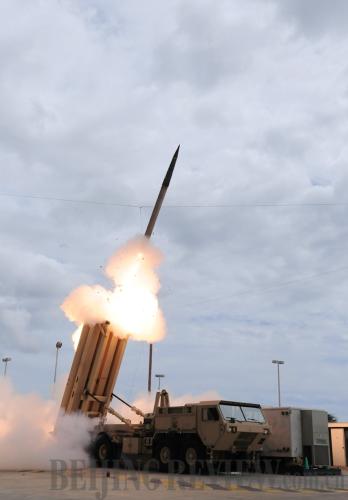|
 |
|
MISSILE DEFENSE: A U.S. interceptor missile is launched during a test on March 17, 2009 (XINHUA/AFP) |
The new verification mechanism is desirable because it is believed to be much more economical and effective than the one put forward by START I. After many years of monitoring, the United States already has a good understanding of Russia's strategic nuclear capacity and deployment. In addition, it no longer needs a complicated verification method due to its advanced satellite surveillance technology. Furthermore, Russia is unlikely to start a nuclear war because its economic, military and technological strength cannot compete with that of the United States.
Since the United States outperforms Russia in almost every respect, transparency measures are enough for the United States to gain a clear understanding of Russia's strategic nuclear systems. If Russia changes its strategic deployment, the United States will be able to respond quickly. Moreover, it can maintain a substantial advantage over Russia with its nuclear and conventional strategic weapons—both offensive and defensive.
Indeed, the United States has always tried to maintain strategic superiority over Russia. That's why it continues to develop the long-range precision attack capacity of its conventional arms while implementing its missile defense program. For example, many military experts believe the U.S. Air Force's X-37B unmanned space plane, which had a debut flight in 2010, has military potential. They pointed out that the vehicle is the prototype of future space fighters, because it is able to scout and capture satellites in their orbits. In addition, it can carry missiles to launch space-to-land attacks.
Moreover, the United States is implementing a series of hypersonic cruise missile programs, such as the U.S. Air Force's X-51A program and the U.S. Navy's ArcLight program. Under these programs, the United States is developing offensive missiles not subject to the limits set by nuclear arms control treaties, which regulate only ballistic missiles.
Russia could have long been aware of the United States' intentions. But because it doesn't have a strong enough economy to support its nuclear weapon programs, it had to sign new START with the United States to seek a balance. Russia also declared it would quit the treaty if the United States unilaterally deploys an anti-missile system or other conventional weapons that threaten Russia's security.
Luo Hui is an engineer with the China Academy of Launch Vehicle Technology; Wang Feng is a research fellow with the academy | 